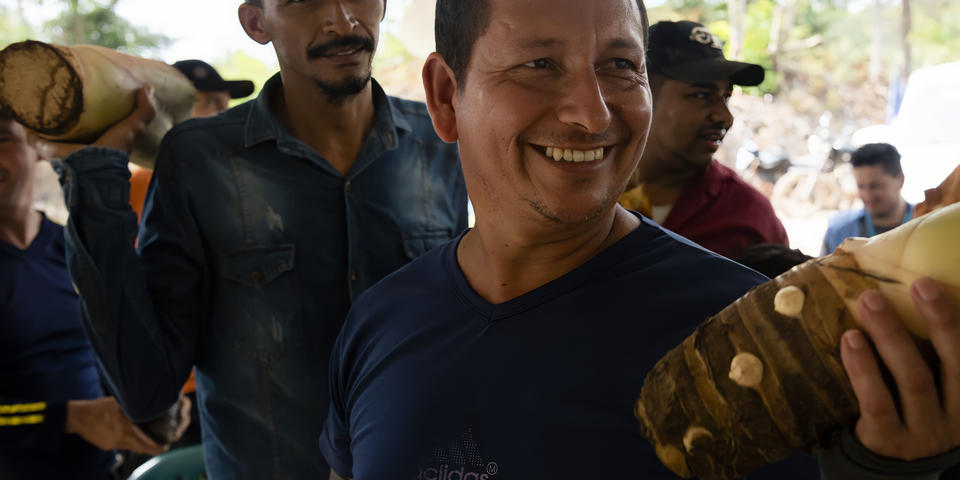The Catatumbo Peace Network brings together peasant cooperatives that have substituted crops for illicit use and the reincorporated population, in order to strengthen their organizations and improve the marketing channels for their products. With the support of PASO Colombia, the Francisco de Paula Santander University - Ocaña and the UN Verification Mission in Colombia , the first meeting of this network was held, which includes 7 cooperatives from Catatumbo, and allowed sharing experiences to together build a complete peace for his territory.
Currently, the cooperatives linked to the network develop different agricultural projects, highlighting among them buffalo breeding, poultry production, pig breeding and others. However, one difficulty they face is access to local or regional markets, whether due to problems of infrastructure, mobility or lack of trust with the local community. For this reason, with the accompaniment of PASO, it was identified that the marketing axis of the Catatumbo Peace Network is essential to provide sustainability to the various productive projects and space for new initiatives.
Sharing successful experiences
During this first meeting, the representatives of the cooperatives got to know the AGROINCAT biofactory, a space organized by women who participated in the Contingency Plan in Support of Coca Eradicating Families , and in which they currently produce artisanal concentrates for animals and biofertilizers. Although they had to cease activities due to the pandemic, the AGROINCAT participants managed to reactivate the biofactory in 2021 and since then they have bet on the production of these artisanal concentrates.
“We did the testing ourselves and learned from the mistake. We tried the first packages [of food] with our animals to see if they liked it, how they were put, to see if they would work. We had ups and downs, but we corrected problems and saw success,” explains Sandra Durán, a member of the association. That is why now that they are sharing their experience with the other cooperatives, they are insisting on the benefits of artisanal recipes, "it is not only that they are cheaper, but that you see how the animals get prettier and when it comes to selling them the meat it is much better”.
AGROINCAT produces 200 kilos of concentrates monthly under the VETCA brand, which are marketed mainly among the members of the cooperative and other local sales.
Thanks to these learnings, AGROINCAT has complemented the production of concentrates with the planting of plants that serve as raw material for these foods. Likewise, it has achieved the production of biofertilizers taking advantage of the microorganisms of the forest in the area, a product that they have also used on their farms to verify the results. In the words of Robinson Ariza, an associate of AGROINCAT, “it is that one is accustomed to a soil that improves it with triple fifteen, and when one goes to this [biofertilizer] one realizes the change. That is with time, I am not telling you that after two days you will see results, but with perseverance the plant becomes more beautiful and you are not harming yourself with chemicals.
“A few years ago we tried and we couldn't, but now we see their experience and we are encouraged again. We admire your work. I am leaving very motivated and this is what peace has to teach us”, said Jair Villamizar, a member of COODEPAZ, at the end of the meeting.
"We are not in a complete peace, but we peasants can build it"
Based on the successful experience of the biofactory operated by AGROINCAT, three of the cooperatives participating in the Catatumbo Peace Network have advanced in their agreements to jointly build another biofactory in the municipality of El Tarra. One of the training days in the framework of the meeting was led by the professor of the Universidad de los Llanos, Ricardo Murillo, who insisted on the importance of productive reforestation that provides the inputs to prepare the recipes. Before the explanation of how to take advantage of the leaves of the cassava or mulberry crops, a participant said excitedly "we were coca scrapers and now we are food scrapers." The future El Tarra biofactory already has the machines to produce these artisanal concentrates there and will have the technical support of PASO Colombia, in charge of Murillo and other professionals.
Just as the participants recognized with alarm that this year the industrial concentrate of fish has risen 3 times in the first quarter, they could see in the artisanal production of VETCA an alternative to make their agricultural projects viable. For this reason, the meeting enabled dialogues to open new sales and support channels between its different production units. Claudia Paola Salcedo, PASO specialist, affirms that the network must propose sales strategies based on short marketing circuits, overcoming the barriers that the reincorporated have to sell their products in the communities surrounding their new settlements. This approach seeks to have a positive impact on the social fabric of this region, which is still affected by security problems and illicit economies, but which has been prioritized among the different plans of the institutions for rural development.
